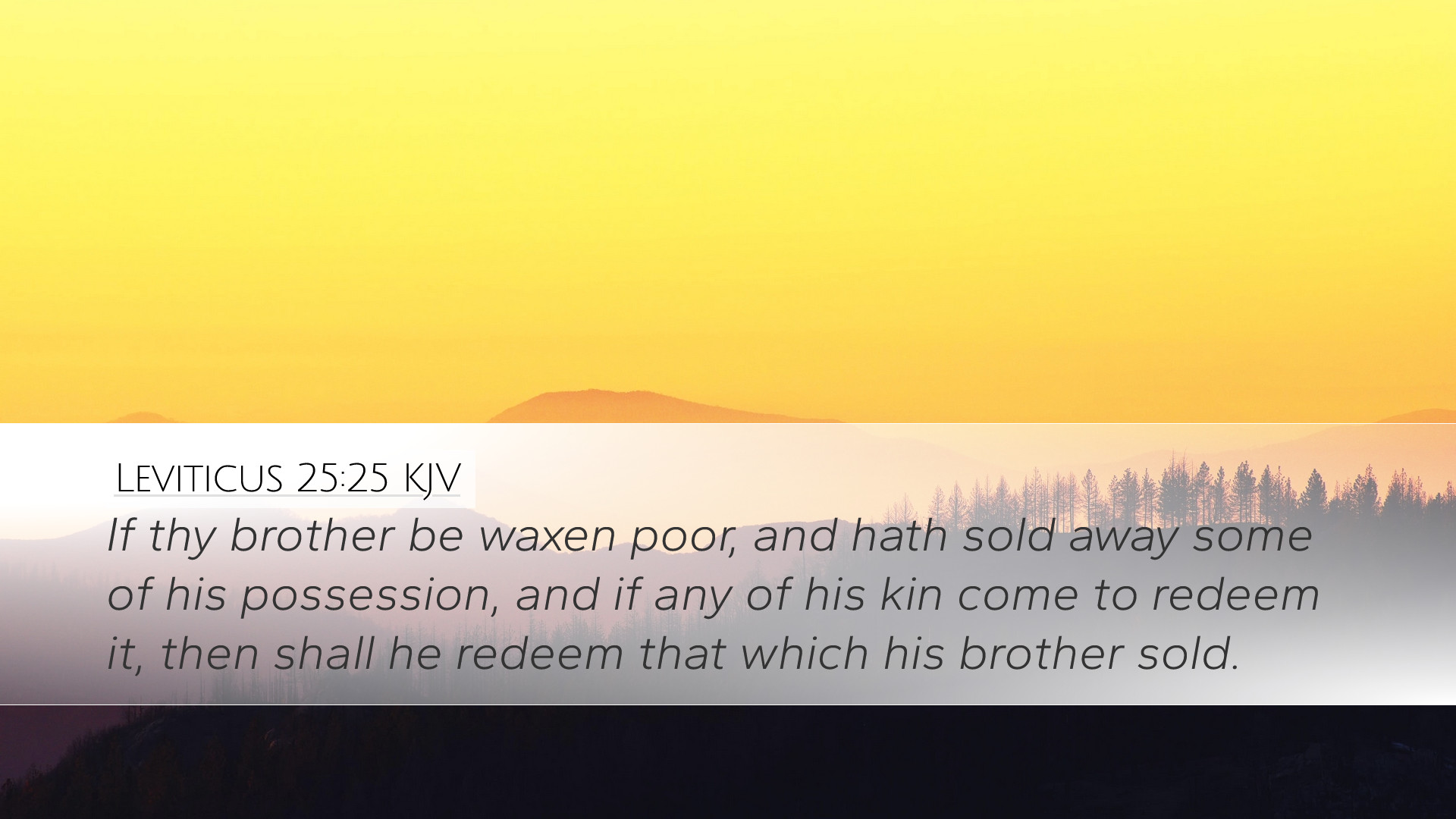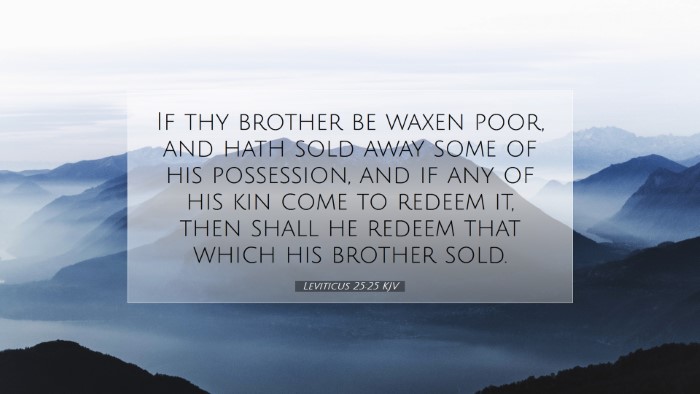Commentary on Leviticus 25:25
Verse Text: "If your brother becomes poor and sells some of his possessions, then his nearest relative shall come and redeem what his brother has sold." (Leviticus 25:25, ESV)
Introduction
This verse from Leviticus introduces the concept of redemption within the socio-economic context of ancient Israel. It reflects God's concern for justice and compassion, demonstrating how the Israelites were to respond to the needs of their fellow community members. Various commentaries, including those of Matthew Henry, Albert Barnes, and Adam Clarke, provide rich insights into the theological implications and practical applications of this mandate.
Contextual Background
Leviticus 25 is part of the Holiness Code and presents guidelines for the Sabbath years and the Year of Jubilee. This chapter emphasizes the importance of land ownership and family lineage in Israelite society, commanding that land should not be permanently sold or lost, and ensuring that every family could return to their land during the Year of Jubilee.
The Importance of Redemption
In ancient Israel, the concept of a "kinsman-redeemer" (Hebrew: גאל, go'el) is foundational to understanding the principle of redemption. The role of the nearest relative was not just a legal obligation but a moral duty to preserve the family line and prevent impoverishment due to misfortune. This shows how intertwined the social fabric was with divine law.
Insights from Commentators
Matthew Henry
Henry emphasizes the kindness and duty of the kinsman-redeemer. He notes that the act of redemption was a tangible expression of love and support within the community. He points out that God's laws were designed not merely to govern but to instill a culture of compassion and mutual responsibility. Henry connects this principle with the redemptive work of Christ, who is seen as our kinsman-redeemer, offering spiritual redemption from sin.
Albert Barnes
Barnes elaborates on the legal aspects of the verse, explaining that it presents an implied future restoration of the property to ensure families maintain their inheritance. He highlights that God's laws were practical, addressing real-life situations faced by the Israelites. His commentary stresses that this provision served to protect the poor and facilitate justice, indicating that God cares for the marginalized members of society.
Adam Clarke
Clarke delves into the implications of property sales amongst the Israelites, emphasizing the redemptive process as a safeguard against long-term poverty. He asserts that it is a demonstration of familial love and responsibility. Clarke also notes the symbolic representation of redemption in the wider narrative of Scripture, where believers find their ultimate redemption through Christ, thus linking the immediate context with the overarching biblical theme of salvation.
Theological Implications
The duty of the kinsman-redeemer extends beyond mere economic recovery; it speaks volumes about God's character and His design for human relationships. Here are some theological implications derived from the verse:
- Divine Justice: God's intention is for all members of the community to thrive and not fall into perpetual poverty.
- Unity and Responsibility: This law promotes a sense of family and community, urging individuals to care for each other's welfare.
- Foreshadowing Christ: The concept of redemption resonates with the New Testament's teaching on Christ's sacrifice and His offer of redemption for all humanity.
Practical Applications
For contemporary pastors, theologians, and students of the Bible, Leviticus 25:25 presents several applicable lessons:
- Advocacy for the Poor: Churches and communities should actively work to support and advocate for those experiencing economic hardship.
- Cultivating Community: Encourage a culture of interdependence where members of the community support one another through acts of love and service.
- Understanding Redemption: Preach and teach on the biblical concept of redemption, tying it into the gospel story and emphasizing the transformative power of Christ's redemption in believers' lives.
Conclusion
Leviticus 25:25 serves as a poignant reminder of God's design for community, care, and redemption. Through the lens of ancient Israelite laws, we gain profound insights into divine principles that continue to shape our understanding of justice and compassion today. The emphasis on the role of the kinsman-redeemer provides a rich backdrop for reflecting on the ultimate redemption found in Jesus Christ, encouraging both personal application and broader communal responsibility.


